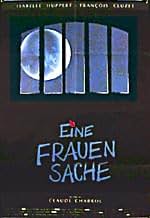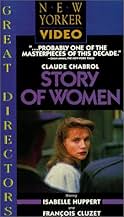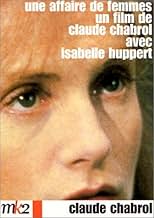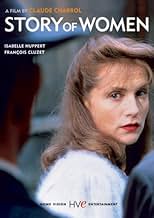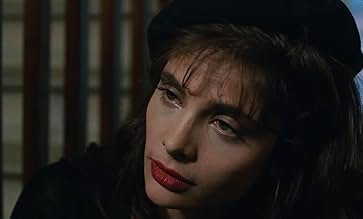IMDb रेटिंग
7.5/10
6.1 हज़ार
आपकी रेटिंग
नाज़ी के कब्जे वाले फ्रांस में, एक गृहिणी को, युद्ध में घायल अपने पति के घर लौटने पर, घर चलाने के लिए संघर्ष करना पड़ता है.नाज़ी के कब्जे वाले फ्रांस में, एक गृहिणी को, युद्ध में घायल अपने पति के घर लौटने पर, घर चलाने के लिए संघर्ष करना पड़ता है.नाज़ी के कब्जे वाले फ्रांस में, एक गृहिणी को, युद्ध में घायल अपने पति के घर लौटने पर, घर चलाने के लिए संघर्ष करना पड़ता है.
- पुरस्कार
- 14 जीत और कुल 8 नामांकन
फ़ीचर्ड समीक्षाएं
Marie (Isabelle Huppert) helps women have abortions in Nazi-occupied France, which turns out to be an unexpected income. However, she was arrested and sentenced to death by the time's reactionary government, looking for public examples to give to the nation.
Marie Latour (in reality her real name was Marie-Louise Giraud), was the last woman to be guillotined in France. The film tells this tragic story with dry realism, both in terms of the dialogues and the era's accurate reconstruction.
The film was in competion at the Italian 1988 Venice Film Festival. Isabelle Huppert won the Coppa Volpi award for best female interpretation, while outside conservative Catholic associations clamoured for the film to be withdrawn from distribution, for Marie's desperate prayer before being beheaded, accused by them fanatic groups to be 'blasphemous'. The film was released anyway.
Marie Latour (in reality her real name was Marie-Louise Giraud), was the last woman to be guillotined in France. The film tells this tragic story with dry realism, both in terms of the dialogues and the era's accurate reconstruction.
The film was in competion at the Italian 1988 Venice Film Festival. Isabelle Huppert won the Coppa Volpi award for best female interpretation, while outside conservative Catholic associations clamoured for the film to be withdrawn from distribution, for Marie's desperate prayer before being beheaded, accused by them fanatic groups to be 'blasphemous'. The film was released anyway.
I'd like to focus on this film as a French film, not of the United States. If one has seen "La Chagrin et la Pitie," then one knows the legacy of this film. France was not perfect during WWII. Not everyone in France was part of the resistance, mainly, they were trying to survive. I think its an amazing film that sheds light on a crucial point in French history. Yes, it's about abortion and Chabrol does a great job ensuring his abortionist is less than perfect. That's a wonderful point he makes, that no one is perfect, not even the moral majority of the government. But, I come away from this film with the same questions that I get from "Lacombe, Lucien," which are: 'what would I have done?' And, please, don't Monday morning quarterback World War II.
'Une affaire de femmes' (the English distribution title was 'Story of Women'), Claude Chabrol's 1988 film gives Isabelle Huppert the opportunity to create one of the most memorable roles of a formidable career. Chabrol, the director about whom Huppert would posthumously say that he filmed her like a father, sets his drama in the period of World War II and the occupation, bringing to screen the biography of the last woman to be sentenced to death and executed in the history of France. The charge was the practice of illegal abortions, and the exemplary punishment was a consequence of the moral and national decay of the Vichy collaborationist regime. The pro-life vs. Pro-choice are still current in many countries of the world today (not in France), but that is not the main theme of the film. In fact, Chabrol avoids any moral judgment on one side or the other of this dispute. His target is - as in many of his other films - the French bourgeoisie during the war, in one of the most abysmal periods of its history, a period marked by collaboration, corruption, immorality and hypocrisy.
The story takes place in the months and the first years after the defeat of France, the occupation of part of the country's territory and the installation in Vichy of a collaborationist government under the leadership of Marshal Petain. Marie is one of many young women left behind alone with two children to care for after her husband leaves for war. She is a simple woman living in a provincial town whose dreams of becoming a singer or even of leading a normal life have been dashed by the war. Somewhat by chance, while helping a neighbor friend, she discovers her ability to perform abortions. The return of her husband does not improve the family situation, on the contrary. Paul, traumatized by the war, becomes an extra burden, and any spark of love that may have existed between the two is now extinguished. Marie decides to turn her talent for helping other women into a source of income. There is no shortage of opportunities. Many women left alone are forced to look for support among occupiers or collaborators, and the children resulting from these relationships are unwanted burdens and risk compromising the mothers morally and socially. Marie's business prospers, the woman begins enjoy her better life, she also takes a lover, while asking herself few questions about what she is doing. However, the jealous husband does not accept the situation.
Isabelle Huppert is perfect in such roles, where facts are ambiguous and feelings repressed. Neither the screenwriters nor the director insist on making any moral judgment about the woman's actions. When she is caught, tried and condemned by a system that wants to make her a punishable example of immorality, the filmmakers' compassion seems to shift more towards the children left behind and destined to remain motherless. Huppert's Marie combines innocence with carelessness, love for children with a desire to live her life at all costs. It's a complex and interesting character, one of the best roles of his career. François Cluzet is her acting partner as the husband whose deeds as a sort of catalyst for the woman's downfall. As for Chabrol, during this period he had filtered and decanted all the lessons of New Wave cinema and had reached a remarkable efficiency and acuity of his means of expression - both in writing the story (inspired by a book by Francis Szpiner - jurist and politician, nowadays mayor of a Parisian arrondissement) but also in working with the camera. With restraint and without pathos, 'Une affaire de femmes' is one of the harshest cinematic indictments of French collaborationism and a statement of compassion for its victims.
The story takes place in the months and the first years after the defeat of France, the occupation of part of the country's territory and the installation in Vichy of a collaborationist government under the leadership of Marshal Petain. Marie is one of many young women left behind alone with two children to care for after her husband leaves for war. She is a simple woman living in a provincial town whose dreams of becoming a singer or even of leading a normal life have been dashed by the war. Somewhat by chance, while helping a neighbor friend, she discovers her ability to perform abortions. The return of her husband does not improve the family situation, on the contrary. Paul, traumatized by the war, becomes an extra burden, and any spark of love that may have existed between the two is now extinguished. Marie decides to turn her talent for helping other women into a source of income. There is no shortage of opportunities. Many women left alone are forced to look for support among occupiers or collaborators, and the children resulting from these relationships are unwanted burdens and risk compromising the mothers morally and socially. Marie's business prospers, the woman begins enjoy her better life, she also takes a lover, while asking herself few questions about what she is doing. However, the jealous husband does not accept the situation.
Isabelle Huppert is perfect in such roles, where facts are ambiguous and feelings repressed. Neither the screenwriters nor the director insist on making any moral judgment about the woman's actions. When she is caught, tried and condemned by a system that wants to make her a punishable example of immorality, the filmmakers' compassion seems to shift more towards the children left behind and destined to remain motherless. Huppert's Marie combines innocence with carelessness, love for children with a desire to live her life at all costs. It's a complex and interesting character, one of the best roles of his career. François Cluzet is her acting partner as the husband whose deeds as a sort of catalyst for the woman's downfall. As for Chabrol, during this period he had filtered and decanted all the lessons of New Wave cinema and had reached a remarkable efficiency and acuity of his means of expression - both in writing the story (inspired by a book by Francis Szpiner - jurist and politician, nowadays mayor of a Parisian arrondissement) but also in working with the camera. With restraint and without pathos, 'Une affaire de femmes' is one of the harshest cinematic indictments of French collaborationism and a statement of compassion for its victims.
With cool detachment and a subtle touch of horror, Claude Chabrol dissects the story of a woman who was guillotined during the Nazi occupation of France. One of his strengths as a director is that he allows the movie goer to form his/her own thoughts and opinions about the issues at hand. He is not a proselytizer.
The film covers a lot of ground: illegal abortion, collaborating with the enemy, parenting, marital communication, greed and a slew of other human weaknesses. All of this against the backdrop of an occupied France, a country who witnessed the horrors of WWI and never fully recovered, and whose WWII soul (what is left of it) has been torn apart.
Isabelle Huppert does a fine job interpreting Marie LaTour, the woman in question. Marie is not the most sympathetic of characters. In fact, most of the major characters are not "sympathique".(My favorite character is the prostitute Lulu, acted by Marie Trintignant.)
All in all a well directed, well structured film about a tragic period in the lives of the French people. But you be the judge.
Trivia: "Vera Drake" and "L'Affaire de Femmes" both begin in apartments which have the the same god awful green walls.
The film covers a lot of ground: illegal abortion, collaborating with the enemy, parenting, marital communication, greed and a slew of other human weaknesses. All of this against the backdrop of an occupied France, a country who witnessed the horrors of WWI and never fully recovered, and whose WWII soul (what is left of it) has been torn apart.
Isabelle Huppert does a fine job interpreting Marie LaTour, the woman in question. Marie is not the most sympathetic of characters. In fact, most of the major characters are not "sympathique".(My favorite character is the prostitute Lulu, acted by Marie Trintignant.)
All in all a well directed, well structured film about a tragic period in the lives of the French people. But you be the judge.
Trivia: "Vera Drake" and "L'Affaire de Femmes" both begin in apartments which have the the same god awful green walls.
Definitely one of director Claude Chabrol's best films, if not his best.
It is based upon a true story out of Nazi occupied France, and stars the incredible Isabelle Huppert (The Piano Teacher, 8 Women). She is supported by Marie Trintignant (Harrison's Flowers), who had her career cut short by an untimely death.
Huppert finds a way to feed her family. She performs abortions and rents out rooms to prostitutes. Everything seems to be going well for her, but her husband is not happy about the fact that he hasn't had any in 10 years, and she now has a lover - he turns her in.
France is now rid of the Germans and is trying to restore her morality. Unfortunately, Marie to be made an example.
Huppert was great, and Trintigant was also very good.
It is based upon a true story out of Nazi occupied France, and stars the incredible Isabelle Huppert (The Piano Teacher, 8 Women). She is supported by Marie Trintignant (Harrison's Flowers), who had her career cut short by an untimely death.
Huppert finds a way to feed her family. She performs abortions and rents out rooms to prostitutes. Everything seems to be going well for her, but her husband is not happy about the fact that he hasn't had any in 10 years, and she now has a lover - he turns her in.
France is now rid of the Germans and is trying to restore her morality. Unfortunately, Marie to be made an example.
Huppert was great, and Trintigant was also very good.
क्या आपको पता है
- ट्रिवियाBased upon the true story of Marie-Louise Giraud, with character names changed.
- साउंडट्रैकLe Poème de l'Amour et de la Mer
Written by Ernest Chausson
टॉप पसंद
रेटिंग देने के लिए साइन-इन करें और वैयक्तिकृत सुझावों के लिए वॉचलिस्ट करें
- How long is Story of Women?Alexa द्वारा संचालित
विवरण
- रिलीज़ की तारीख़
- कंट्री ऑफ़ ओरिजिन
- आधिकारिक साइट
- भाषाएं
- इस रूप में भी जाना जाता है
- Une Affaire De Femmes
- फ़िल्माने की जगहें
- Coulommiers, Seine-et-Marne, फ़्रांस(interiors: women's prison)
- उत्पादन कंपनियां
- IMDbPro पर और कंपनी क्रेडिट देखें
बॉक्स ऑफ़िस
- US और कनाडा में सकल
- $4,38,483
- चलने की अवधि1 घंटा 48 मिनट
- ध्वनि मिश्रण
- पक्ष अनुपात
- 1.66 : 1
इस पेज में योगदान दें
किसी बदलाव का सुझाव दें या अनुपलब्ध कॉन्टेंट जोड़ें



